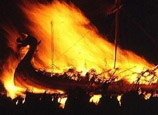
WASHINGTON, Feb. 27 (Xinhua) -- Katrina Browne was floored when she learned she was the direct descendant of one of the biggest slave traders in perhaps the most shameful chapter of U.S. history.
The Philadelphia native is the seventh generation descendant of Mark Anthony DeWolf, whose family business sailed ships from Bristol, Rhode Island in the 1700s and 1800s to Africa, bringing back more than 10,000 African men, women and children to the New World in a lucrative enterprise.
"I had a double shock," Browne said of the day she found out through a letter that her grandmother, the family historian, had sent to relatives.
"The first shock was 'Oh my God, I'm descended from slave traders,'" she said. The second was that she realized she had already known, although family lore had trivialized and even romanticized the issue, describing her forebears as "pirates" or " scallywags."
"I would say I felt like fainting. It was a very visceral reaction," she said. "In a sense, you could compare it to discovering that you were descended from an officer in Nazi Germany."
Browne's distress would later drive her to make a documentary film, entitled "Traces of the Trade: A Story of the Deep North," which uncovers the family's past and traces one of the most common slave trading routes used two centuries ago. The 2008 film, shot in the U.S., Ghana and Cuba, has been shown at the Sundance film festival and elsewhere.
Browne also founded the Tracing Center on Histories and Legacies of Slavery, a non-profit dedicated to educating people about the history of slavery, complicity in slavery in the U.S., and the legacy of that history today.
The film and her work have particular significance this year, as 2013 marks the 150th anniversary of the Emancipation Proclamation, the law signed by former President Abraham Lincoln banning slavery in the U.S. That event is highlighted in the film Lincoln, for which Hollywood veteran Daniel Day-Lewis won the best actor prize in Sunday's Oscar awards.
"To be a captain on a slave ship is to be part of the worst brutality of it," Browne said, adding that there were varying degrees of violence used to keep enslaved Africans subdued. "The institution was fundamentally violent."
While slavery is often associated with the Southern U.S., the institution thrived in the North until it was outlawed in the early 1800s, and entire economies were wrapped up in the trade.
Indeed, shipbuilders built ships for slave trading voyages. Bread from bakers, vegetables from farmers and other supplies were needed for the voyage. Ropes, guns and other items had to be purchased from all over the state of Rhode Island, and many citizens would buy shares in slave ships in order to make a profit, according to Browne.
It would have been difficult to find anyone not engaged in the slavery economy, she said, citing numerous records that have been preserved from the period.
"People don't realize there was slavery in the North for over 200 years. And when it existed it was more widespread in the population," she said. "More people in the North held enslaved Africans but usually they would own one or two people, as opposed to in the South, which had major plantations (with hundreds of enslaved Africans)."
Mark Anthony's son James DeWolf helped grow the family business. A member of the Rhode Island House of Representatives, he served as speaker of the House at one point and had also been a U.S. Senator. DeWolf became the wealthiest man in the state, if not the region, and by the end of his life was said to be the second richest man in the U.S.
James DeWolf Perry, executive director of the Tracing Center on Histories and Legacies of Slavery, said that no one in the family is trying to excuse DeWolf for his part in bringing enslaved Africans to the New World, adding that the family's ancestor, James DeWolf, was "responsible for widespread suffering and death. "
The DeWolfs continued to ply their trade even after it was outlawed in the North, as their connections to the administration of third U.S. President Thomas Jefferson ensured their illegal slave trading could continue to operate unchecked, Browne said.
Other forms of slavery also survived in the South well after the end of the Civil War and into the first decades of the 20th century. Black men were sometimes imprisoned on trumped-up charges and leased out to local landowners to toil in the fields or mines for no pay, experts said.
Even today, many black Americans are still feeling the economic impacts of slavery, with unemployment higher than average among the group and many blacks still living in de-facto segregated neighborhoods with less access to good education than those living in affluent suburbs, they said.
Others, however, note the increasing level at which African Americans have attained middle class success or beyond. The election of U.S. President Barack Obama, for whom many whites voted, shows the U.S. has come a long way, some observers note.
Noting that 2013 marks the 150th anniversary of the Emancipation Proclamation and the 50th anniversary of the March on Washington -- one of the biggest civil rights rallies in U.S. history -- Browne said, "It seems to me, this year, 2013, really begs the question 'where are we now?'"
















 Special Lantern Festival in Shaanxi Women's Prison
Special Lantern Festival in Shaanxi Women's Prison


![]()
